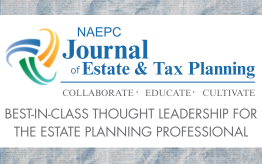February, 2010 Newsletter
Provided by Leimberg Information Services
See other issues.
It's Not Just About Taxes
As this week comes to a close, the pundits in Washington are still trying to make sense out of the amazing turn of events that resulted from the special election to fill the seat vacated by the late Senator Ted Kennedy. Although it remains to be seen what the long-term impact will be on the Obama Administration's legislative agenda, it's clear that the reset button has been pushed in a most emphatic way.
Meanwhile, as Deborah Jacobs demonstrates in her commentary, despite all the havoc and uncertainty, there are marketing opportunities for estate planners. As Deborah points out, they don't involve brilliant tax saving techniques with high transaction costs. Rather, this may be the time to lead the way with damage control.
Deborah L. Jacobs is a lawyer and award-winning journalist specializing in legal topics who has contributed to many publications, including The New York Times, Bloomberg Wealth Manager and BusinessWeek. Her new book, "Estate Planning Smarts: A Practical, User-Friendly, Action-Oriented Guide" (DJWorking Unlimited, 2009), is available through booksellers and at www.estateplanningsmarts.com
Here is her commentary:
EXECUTIVE SUMMARY:
As we enter the New Year, we're all living with the estate tax in limbo, while Congress ponders next steps. With the current uncertainty about the future of the tax, aggressive tax moves carry more than the usual risks. Measures designed to take advantage of new loopholes may become ineffective once Congress acts. Let's all hope that happens sooner, rather than later.
FACTS:
Here's where the situation stands:
· Both the estate tax and the generation-skipping transfer tax were repealed at the end of 2009
· Both taxes are scheduled to return in 2011 at the unfavorable rates that applied 10 years earlier. The amount that is exempt from each of these taxes will then be $1 million, and the tax on the rest will be 55 percent
· There is still a gift tax for people who give away more than $1 million during life, but the top tax rate has been reduced from 45 percent to 35 percent
· Heirs can no longer increase the cost basis of inherited assets to reflect their fair market on the date of death. Instead, the original cost basis of the property applies. This means that when they sell the assets, there will be capital gains tax on the appreciation. Each estate can exempt $1.3 million of gains from this carryover basis rule. Another $3 million exemption applies to assets inherited from a spouse.
Most estate planners expect Congress to restore the taxes retroactively. There's significant support for putting back in place the system that applied in 2009: a $3.5 million exemption for estate tax and generation-skipping transfer tax, with a 45 percent rate for these two taxes as well as the gift tax.
Past court cases suggest that restoring the tax this way is perfectly legal. But people with enough at stake may bring lawsuits arguing that a retroactive tax is unconstitutional. Prompt Congressional action after the holiday recess would reduce the incentive to bring these cases.
Short-Term Crisis Management
Meanwhile, in all the havoc, there are marketing opportunities for estate planners. But they don't involve brilliant tax saving techniques with high transaction costs. Rather, this is a time to lead the way with damage control.
If the weeks drag into months without resolution on the tax front, estate planners should apply their energies to addressing the two biggest potential trouble spots for the estates of clients who die in 2010:
Formula Clauses in Estate Planning Documents
Including these clauses in wills and living trusts has been good standard practice to take maximum advantage of the estate tax exemption, which kept increasing. Phrases like "that portion," "that fraction" or "that amount" (without saying what it was) described the sum that would go into a bypass trust, for example.
But these clauses had become potentially troublesome even before the estate tax was repealed. In 1999, the exemption was $650,000; by 2009, it had reached $3.5 million. Therefore, in estate plans structured to take full advantage of the estate tax exemption, more than ever before would go into a bypass trust and less to a surviving spouse. By 2009 this didn't necessarily reflect every client's preference.
Depending on how a formula clause is drafted, estate tax repeal could create this problem in even more cases. If the bypass trust isn't set up to make payments to the spouse (for example, if it only benefits children from a previous marriage), the spouse could wind up with nothing. Another possibility is that even if the trust does benefit the spouse, all the money will be locked up in this trust, and there will be no marital share.
Lawyers who drafted potentially troublesome documents should take affirmative steps to track down the clients who signed them, and make the necessary amendments at nominal cost. Given the potential labor involved, this will almost certainly turn out to be a loss leader. But it is the perfect excuse to contact clients who have been out of touch. It is a smart public relations move that can strengthen attorney-client relationships and lead to more work going forward. Perhaps most importantly, it is the right thing to do.
Recordkeeping Nightmares
Clients would do loved ones a favor by organizing records to readily show the cost basis of assets they might ultimately inherit. Many people who did not previously need to be concerned about estate taxes will be affected by the carryover basis rule. Lawyers can call this to clients' attention and, to the extent that a firm has the necessary support staff, offer to help.
Of course, identifying the cost basis of some assets, like a home, will be easy. But what about clients who gradually accumulated Apple stock? They might be stuck hunting for old transaction slips and adjusting for stock splits along the way. The prospect of scenarios like this one makes carryover basis seem too onerous and impractical, from an administrative perspective, to stick. But there's no harm being prepared – just in case it does.
Thinking Ahead
Once Congress takes action and the fury subsides, estate planners still face a significant challenge. The economic crisis that began in 2008 lowered many people's net worth. And this together an exemption amount that is almost certain to stay high radically alters the estate planning landscape. Even once the tax is restored, with very little effort it will generally be possible to structure estate plans so that taxes will not be an issue. Advisers who work in this field must adapt their services to address the new realities.
Assuming Congress reinstates the $3.5 million exemption, making gifts that would require the payment of gift tax may not be appropriate unless spouses already have at least $10 million – or expect to in the near future. Nor will complex leveraging techniques like the grantor retained annuity trust and the installment sale to a grantor trust.
What makes $10 million the magic number? The first $3.5 million each person leaves behind is exempt from federal estate tax. With planning, a married couple can avoid this tax until their combined assets are more than $7 million and would face estate tax only on $3 million of their assets. By taking advantage of the unlimited marital deduction, they can postpone that tax until the second of them dies. (Assuming the inheriting spouse is a U.S. citizen.) To avoid federal tax altogether, this couple would need to give away $3 million while they are alive.
People on the cusp of being subject to estate tax can shed their wealth with some very low-tech tools:
· Maximize use of the annual exclusion. Using the gift tax annual exclusion, they can give $13,000 ($26,000 for a married couple) each year to each of as many recipients as they would like without incurring gift tax. This idea might be especially appealing right now to clients who want to help family members with current expenses. For example, a couple with an adult child who is married and has two children could make a joint cash gift of $26,000 to the adult child, the child's spouse and each grandchild – four people – providing the family with $104,000 a year.
· Fund Section 529 plans. In lieu of cash gifts, clients can use the annual exclusion to put money into Section 529 education savings plans for family members. The law permits lump-sum deposits of as much as $65,000 a person at once ($130,000 for married couples), provided the donor files a gift-tax return that treats the gift as if it had been spread over five years. If she dies before that time is up, the part of gift that reflects the number of years still to go will be considered part of her estate. Should she end up needing the money herself, any earnings that are withdrawn are subject to income tax and a 10 percent penalty.
· Pay tuition and medical expenses. Without using the annual exclusion or doing any fancy estate planning, it's also possible to pay for tuition, dental and medical expenses. The only condition is that these med-ed payments, as they are called, must be made directly to the providers of those services. For example, if a parent is temporarily out of work and loses health insurance coverage, the grandparent could pay the premium for the entire family.
Simple as these steps are, there are ways advisers can add value. To reduce the paperwork for grandparents paying for med-ed expenses, Michael N. Delgass, a lawyer and financial adviser at Sontag Advisory in Westport, Conn., creates an agency account: the client opens a bank account in her own name and puts in whatever amount she wants (she can add to it as the need arises or her budget permits). Using a form that the bank provides, she gives another person a power of attorney for the account. One of his clients now uses this tool to help a grandchild who became paralyzed through a swimming accident. The grandchild's parent has the authority to write checks from the account to the child's health care providers.
Although clients do not need a lawyer to set one of these accounts, they do need to trust the person who has checkwriting power not to spend the money on other things. Some might prefer that a lawyer or financial adviser play this role.
For clients who want to help multiple family members without being pestered, Lloyd Leva Plaine, a lawyer with Sutherland, the Washington-based firm, recommends what she calls a "buffer trust." Beneficiaries of this trust are not entitled to payouts, but can request help as they need it from whoever is named as trustee (it could be another family member or a professional).
Under the terms of this trust, payouts can be made only for direct med-ed payments and annual exclusion gifts, including those put into Section 529 plans. Unlike trusts used to reduce estate taxes, this one can be revoked, if the client decides she needs the money herself and it hasn't been spent.
Convert a traditional IRA to a Roth IRA. If clients want to leave retirement assets to family or friends, converting a traditional IRA to a Roth IRA is one of the simplest, best planning tools available. A client will owe income tax on the amount converted. But subject to certain restrictions, no tax is assessed when the money is withdrawn, so income can compound tax-free. She also avoids the requirement to take yearly minimum distributions starting at age 70 1/2, and that can leave more for beneficiaries if she doesn't use the money herself.
Starting in 2010, anyone, regardless of income, can do a Roth conversion, and clients can use lawyers' help here too – both to decide whether a Roth is right, and to get the best results. Traps await the unwary in completing the forms necessary to do the conversion and filling out the new beneficiary designation form that's required for each account.
There are also strategies associated with timing the income tax. For conversions done in 2010, the law offers a choice of when to pay it. One possibility is to count the amount converted as 2010 income and pay a lump sum. The other option is to divide the income equally in the following two years, in which case you clients must use installments – half with the 2011 income tax return and the remainder with the 2012 one, at the rates in effect for each of those years. Clients will appreciate help weighing the options.
In the changing world of estate planning, trusts will continue to be an important tool, but not necessarily for tax saving. Instead, the focus may shift to other crucial purposes that trusts can serve: to hold money for minors, forestall spendthrift family members, or protect assets from former spouses or creditors, for example.
Advancements in medical science and care may enable us to live fuller, longer lives. But that also means more clients are likely to suffer from a diminished mental state – a harsh reality that's difficult to accept. It's not enough for advisers to draft a revocable trust and durable power of attorney. Clients also need help selecting trustworthy people to administer these arrangements. Think Brooke Astor.
Demographics play a role, too. As the baby boomers reach the prime age for estate planning, psychodynamics will be just as important at this stage of their lives as they have been earlier. One of the key issues they will grapple with is how to divide the pie between various family members, especially children.
Tempting as it may be to tailor a plan to the personalities, abilities and needs of individual family members, disparate treatment, particularly of children, can rekindle old rivalries or ignite new ones. Treating all children equally improves the chances that they will peacefully coexist.
That said, it is reasonable to take note in planning of children's career decisions, choice of a spouse and all the unforeseeable events that a parent witnesses in a child's life. Baby boomers will be introspective about these issues, just as they have been with many aspects of raising their children. Along the way, they may expect empathy and guidance from their advisers.
COMMENT:
Although the long-term effect of the financial/political crisis remains unclear, it's possible that many people, especially the baby boomers and their parents, will need to be more careful about money for the rest of their lives. And now, more than ever, the planning process is not just about money and taxes but also about love, family and legacy.
HOPE THIS HELPS YOU HELP OTHERS – MAKE A POSITIVE DIFFERENCE
Deborah Jacobs
CITE AS:
LISI Estate Planning Newsletter #1582 (January 21, 2010) at http://www.leimbergservices.com Copyright 2010 Leimberg Information Services, Inc. (LISI). Reproduction in Any Form or Forwarding to Any Person Prohibited – Without Express Permission.
All NAEPC-affiliated estate planning councils are eligible to receive a discounted subscription rate to the Leimberg LISI service. Please see more information about the offering. You may also contact your local council office / board member to find out whether they are offering the service as a member benefit.





